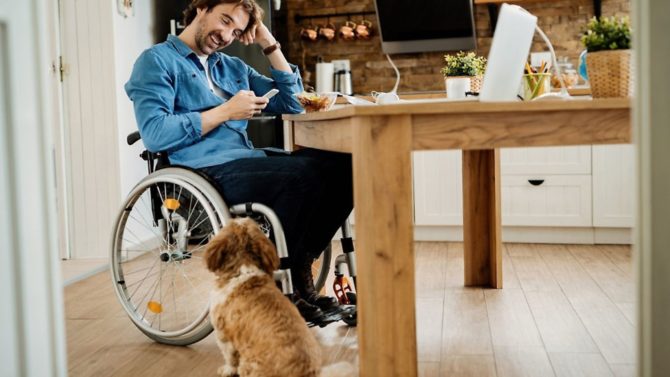How to set up an internet connection at your French property


Fast broadband is becoming more readily available in France than in the UK, making life easier for homeowners, especially if you run a gîte or want to work from home, says Andrew Holford

Until only a few years ago, installing broadband in France required a phone line, one engineer for your home and one from France Telecom for everything up to your outside wall. Only then could you connect to broadband, the speed of which still depended upon what was available, and how may properties were simultaneously trying to connect.
Then came the massive state-led investment Plan France Très Haut Débit, and now fast broadband is quickly becoming more available in France than in the UK. Phones are all becoming VoIP (Voice over Internet Protocol). ADSL (Asymmetric digital subscriber line) is being replaced by fibre.
Broadband is now a necessity. Today, you just need to look at the options that fit your needs. First on the list is how often do you need broadband access? This falls into three distinct groups, the permanent resident, the three-months-a-year visitor and the gîte provider. Fortunately, technology and the emergence of a thriving, competitive and reliable 4G alternative has made life much easier.
Permanent resident
If your property already has a landline, then the normal broadband fixed line option is still a good reliable choice. Orange (formerly France Telecom) is the only operator which can install or reactivate fixed landlines. If you’re not feeling competent enough to deal direct with Orange you can appoint an agent to handle everything for you. UK Telecom do this in the UK and Phonexpat-Stragex provide a similar English-speaking service in France. Pricing is similar, yet it is worth remembering opening hours of their customer help desks are often governed by their physical location.
Seasonal visitor
Post-Brexit, Britons will be allowed to spend no more than 90 days in any 180-day period in the Schengen area (including France) without a visa. Many second homeowners will want to visit during the warmer months, which means their French homes may be closed for 75% of the year. If this is the case for you, an annual fixed line contract is unlikely to offer good value.

For mobile broadband you just need to buy a router and find a SIM card. Many UK data SIM cards work in the EU, yet data allowances can be small and extra data is costly. UK style pay-as-you-go (PAYG) offers are not available in France, but they do have 30-day contracts and all the French mobile networks will be using this time of change to secure new customers.
A quick look at quechoisir.org will show some of today’s current deals. A problem you will encounter is the lack of unlimited mobile data offers. A data-hungry household can use over 250GB every month yet in France 100GB is the normal maximum allowance. Until fibre is more common, your 4K TV usage may need to be limited.
________________________________________
Don’t miss
How to find a plumber in France
A guide to freelancing and self-employment in France
_______________________________________
Holiday host
As a gîte operator, if you have regular guests then your needs will be similar to those of a permanent resident. Again, look at your potential use and if a reasonable mobile signal exists you may want to consider 4G to avoid recurring rental cost, albeit without the protection of unlimited data that comes with fixed line broadband. Whether you’re operating a gîte or just using your home for family and friends, broadband can offer you many facilities. It can also bring unexpected restrictions, which can be disappointing for you and can also deter guest bookings.
For new visitors, many are surprised they cannot view the UK internet. In its place they see the French equivalent and find access to some websites is restricted. Top of the list is access to UK television, for even on holiday, guests from the UK love to watch their favourite UK programmes. Television access is still possible. On-demand (recorded) is the most common, yet live viewing is also possible. Most telecom agents will provide a low-cost or free version of on-demand. If you need live television your route has, until recently, been to use a VPN (virtual private network) service. VPNs are best described as a cloaking service. For they disguise your actual location and replace it with your preferred country. VPNs have become popular, yet multiple users can slow access speeds and cause buffering. UK websites also learn the cloaking addresses being used by VPNs and can cut off your access.
A more superior method of accessing the internet, just as if you were in the UK, is by using a process called tunnelling. One such service is uksofa.eu. With a UKSofa box you connect your device/s via wifi or cable and all your web access is then routed down your own private tunnel which emerges in the UK. The service includes a genuine UK address, so you have totally unrestricted access to all the UK internet. They even allow multiple users, so all your family and any guests can all log in at any time to view any sites they wish. The only restriction being your available data allowance.
Internet issues
Working from home is a great way of increasing your time in France. Fortunately, the French and UK phone and data infrastructure provides more features than most of us will ever need. There are a few pitfalls that need to be covered, particularly if you don’t want your UK contacts to know you’re in France – and not at your UK desk.
Be aware that when you visit any website your request is preceded by a data flow that identifies your current location. If you’re in France and the website you want to visit does not allow foreign viewing, you will be denied access or routed to a local alternative. A good way to test this is to try to access google.fr when you’re in the UK. If you’re in France, try visiting google.co.uk. Emails are also a problem. If you send an email you may also be sending your IP address, particularly if you use Contact Us pages on websites. To prevent all these location issues, a VPN or UKSofa-style service will keep you hidden.
Phone lines
Broadband has become an essential for any rental property, but for non-rental second homes, a working home telephone is also considered essential. The days of the traditional phone are coming to an end, in France and the UK. Both countries have started the conversion process from analogue phones to voice over internet protocol, or VoIP. In these changing times connection is no longer by an old copper cable, it’s now all done by data. Old wired phones are being replaced by fibre and new phone line requests will initially route via 4G.
It’s easy to put an office phone on divert to France, yet before you answer, you’ll need to change the French ring tone to a UK version. It’s easy to do and most telecoms providers will have a solution. A cheaper option would be to divert the caller to what’s known as a UK softphone app hosted on your mobile. A version of this is actually available with UKSofa’s service. You are then left with how to make calls from France that will show your UK work number to your destination. The solution is a number masking service, it’s strictly controlled yet easy to do.
Working from your home in France has never been easier. Add technology and your property may also increase in value.
Andrew Holford is Director and Founder of CommerceCall
Share to: Facebook Twitter LinkedIn Email


